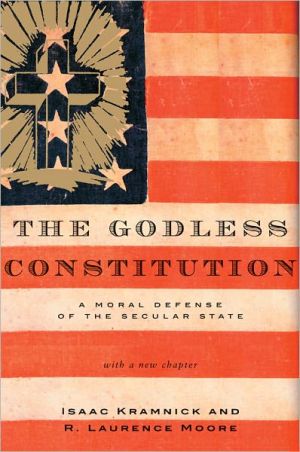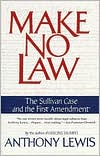The War on Terrorism and the Rule of Law
Review "Richard Pious has written this timely, much-needed, definitive book on important issues and cases arising from controversies about the rule of law in counterterrorism and the post-9/11 'war on terrorism' in particular. I recommend this volume very highly as mandatory reading and basis ofdiscussions in courses on terrorism and counterterrorism, civil liberties, human rights, war and peace, constitutional law, and American government (i.e., the presidency, the congress, and the...
Search in google:
Pious' book provides a detailed discussion of due process issues invoked by the George W. Bush administration's war on terror.This book questions the premise that the government's obligation to protect Americans from terrorist acts leads to an inevitable tradeoff between constitutional and legal guarantees of due process. Instead, Pious argues that bringing terrorists to justice through the due process of law provides more rather than less security.The introductory chapter begins by laying out worst-case scenarios for terrorist attacks on the United States. Case studies of recent court cases document that when law enforcement takes shortcuts it may not only result in the imprisonment of innocent people, but also distorts or falsifies the intelligence needed to deploy law enforcement resources in the most efficient manner. Subsequent chapters apply this perspective to such topics as government surveillance (including warrantless surveillance), data-mining, immigration "hold and clear" hearings, the application of material support and material witness statutes, rules of evidence determining access to witnesses, the indefinite detention of American citizens and non-citizens, the use of military hearings, and the authorized and unauthorized mistreatment of detainees to obtain intelligence.Pious provides accessible, up-to-date materials such as testimony and speeches by Bush administration officials presenting their arguments for an "intelligence-driven" approach rather than a due process approach to combat terrorism, congressional testimony refuting these claims, proposed legislation to require adherence to due process of law, recent statute law delegating extensive power to government officials, and federal cases attempting to strike a balance between governmental prerogative claims and the rights of defendants. The cases have been extensively edited to make them accessible to undergraduate students and other non-lawyers.The author provides extensive commentaries and notes, some of which are based on his own research, and others that present alternative viewpoints. These are designed to stimulate students, organize class discussion, and point out further avenues of research and inquiry. Suggested readings at the end of the book provide students with a preliminary bibliography for short essays or longer research papers.
Acknowledgments viPreface viiiNotes on Editing xHow to Read and Take Notes on Cases xiiHomeland Security: Must We Trade Civil Liberties for National Security? 1Strategy for Eliminating the Threat From the Jihadist Networks of Al-Qida: Status and Prospects 5Public Law 107-40 107th Congress (Excerpts) 9FBI Memorandum on the Koubriti Case 18Leahy's Opening Comments, June 8, 2004 19President Discusses War on Terror at FBI Academy 22Questions and Comments 26Endnotes 28Surveillance Techniques: May the President Override Patriot Act and Foreign Intelligence Surveillance Act Provisions? 31In Re All Matters Submitted to the Foreign Intelligence Surveillance Court 36In Re Sealed Case N. 02-001 (United States Foreign Intelligence Surveillance Court of Review) 42Letter From Senator Rockefeller to the White House 52President Bush's News Conference, December 19, 2005 53Questions and Comments 55Endnotes 61Data Mining: Does the Patriot Act Infringe on Privacy Rights? 62Doe v. Ashcroft 64Questions and Comments 72Endnotes 77Material Support: Does the Patriot Act Impede Freedom of Association? 78Humanitarian Law Project v. Ashcroft 81Questions and Comments 87Endnotes 90Material Witnesses: Can the Government Hold Them in Indefinite Detention? 91United States v. Awadallah 95In Re Grand Jury Material Witness Detention 102Questions and Comments 104Endnotes 107Hold and Clear: May the Government Hold Aliens in Indefinite Detention? 108North Jersey Media Group, Inc. v. Ashcroft 112Questions and Comments 119Endnotes 123Indefinite Detention of American Citizens: Is It Constitutional? 125Part One 125President Bush's Military Order 128Padilla v. Hanft 130Padilla v. Hanft 138Padilla v. Hanft 142Questions and Comments (Part One) 144Part Two 148Declaration of Michael H. Mobbs, Special Advisor to the Under Secretary of Defense for Policy 149Hamdi v. Rumsfeld 153Questions and Comments (Part Two) 160Endnotes 164Indefinite Detention of Enemy Combatants: Is It Constitutional? 165President Bush's Military Orders: Detention, Treatment, and Trial of Certain Non-Citizens in the War Against Terrorism 167Rasul v. Bush 171Questions and Comments 174Endnotes 180Interrogation: Are There Limits? 181Gonzales Memo to the President 186Memorandum From President Bush on Geneva Protections 191Department of Justice Memorandum on Torture (Excerpts) 194Memorandum for General Counsel of the Department of the Air Force 196Pentagon Guidelines for Interrogations 198Testimony of John D. Hutson (Excerpts) 203Press Briefings by Scott McClellan, The White House 206Congressional Record, Oct. 5, 2005: Remarks of Senator McCain 209S.1042 National Defense Authorization Act for Fiscal Year 2006 211National Security Adviser Hadley Holds Briefing on the McCain Amendment, as Released by the White House, December 15, 2005 212Questions and Comments 214Endnotes 221Military Tribunals: Is There a Role for Judicial Oversight? 223Military Order: Detention, Treatment and Trial of Certain Non-Citizens in the War Against Terrorism (Excerpts) 231Hamdan v. Rumsfeld (344 F. Supp. 2d 152 [2004]) 233Hamdan v. Rumsfeld (415 F.3d 33 [2005]) 239H.R. 1290 Military Tribunals Act of 2003 (Excepts) 246Questions and Comments 249Endnotes 257Sources for Further Reading 260Books 260Government Reports 261Law Review Articles 261Index of Cases in United States Courts 264Index of United States Statutes and Bills Introduced 265Index of Presidential Executive Orders and Military Orders 265Name and Subject Index 266








